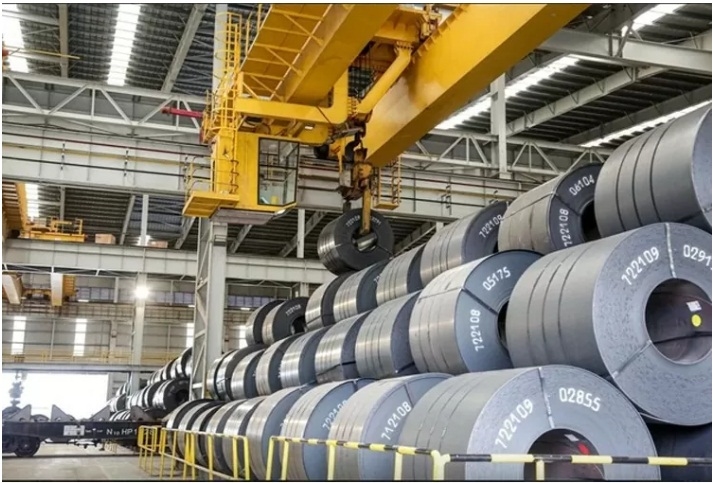Hot rolled coil steel import is equal to 173% of domestic production
Wednesday, July 17,2024
AsemconnectVietnam - In the first 6 months of 2024, hot rolled coil steel import reached nearly 6 million tonnes, up 32% over the same period in 2023, equal to 173% of domestic production.
According to Customs data, in June 2024, Vietnam imported 886,000 tonnes of hot-rolled coil (HRC), equal to 151% of domestic production. Of which, amount of HRC steel imported from China accounted for 77%. Regarding price of imported HRC, price of HRC imported from China are very low with an averaging level of 560 USD/tonne, 45-108 USD/tonne lower than other countries.
Accumulated in the first 6 months of this year, hot-rolled steel import reached nearly 6 million tonnes, an increase of 32% over the same period in 2023. This volume is equal to 173% of domestic production. Of which, amount of steel imported from China accounted for 74%, the rest was from Taiwan (China), Korea, India, Japan and other countries.
HRC import turnover in 6 months reached 3.46 billion USD, of which China alone accounted for 2.5 billion USD.
Main imported steel grades are Q195 and Q235. These grades are priced lower than ASTM, SPHC and other grades by 74-97 USD/tonne.
Hot rolled coil (HRC) is the base steel - input material for production of steel pipes, galvanized steel, structural steel, container shells and many other downstream products.
On June 30, 2024, Indonesian Trade Minister Zulkifli Hasan said that oversupply in China has led to the country shifting its exports to other markets such as Indonesia. The country will soon apply an import tax of up to 200% on Chinese goods to minimize impact of ongoing trade competition between China and the US. Indonesian Trade Minister Zulkifli Hasan said that this policy will take effect after relevant regulations are issued.
Thailand and Indonesia have socio-economic conditions quite similar to Vietnam. Steel production output of two countries is lower than domestic demand. Production output of Thailand and Indonesia only meets 43% and 37% of consumption demand, respectively and since 2019, these two countries have had anti-dumping taxes in addition to the MFN import tax they are maintaining. Meanwhile, Vietnam's current HRC production capacity has met 70% of consumption demand (8.5/12 million tonnes) and currently has no MFN import tax and no other tariff barriers to protect domestic production. Vietnam is currently leading in Southeast Asia in steel production and is in the Top 12 largest steel producing countries in the world. Timely measures are needed to protect domestic production. Ministry of Industry and Trade is reviewing dossiers of domestic enterprises requesting an investigation to impose anti-dumping taxes on hot-rolled steel imported from China and India. The prescribed appraisal period is 45 days from date of official receipt of complete documents (June 14, 2024).
Source: Vitic/ congthuong.vn
Accumulated in the first 6 months of this year, hot-rolled steel import reached nearly 6 million tonnes, an increase of 32% over the same period in 2023. This volume is equal to 173% of domestic production. Of which, amount of steel imported from China accounted for 74%, the rest was from Taiwan (China), Korea, India, Japan and other countries.
HRC import turnover in 6 months reached 3.46 billion USD, of which China alone accounted for 2.5 billion USD.
Main imported steel grades are Q195 and Q235. These grades are priced lower than ASTM, SPHC and other grades by 74-97 USD/tonne.
Hot rolled coil (HRC) is the base steel - input material for production of steel pipes, galvanized steel, structural steel, container shells and many other downstream products.
On June 30, 2024, Indonesian Trade Minister Zulkifli Hasan said that oversupply in China has led to the country shifting its exports to other markets such as Indonesia. The country will soon apply an import tax of up to 200% on Chinese goods to minimize impact of ongoing trade competition between China and the US. Indonesian Trade Minister Zulkifli Hasan said that this policy will take effect after relevant regulations are issued.
Thailand and Indonesia have socio-economic conditions quite similar to Vietnam. Steel production output of two countries is lower than domestic demand. Production output of Thailand and Indonesia only meets 43% and 37% of consumption demand, respectively and since 2019, these two countries have had anti-dumping taxes in addition to the MFN import tax they are maintaining. Meanwhile, Vietnam's current HRC production capacity has met 70% of consumption demand (8.5/12 million tonnes) and currently has no MFN import tax and no other tariff barriers to protect domestic production. Vietnam is currently leading in Southeast Asia in steel production and is in the Top 12 largest steel producing countries in the world. Timely measures are needed to protect domestic production. Ministry of Industry and Trade is reviewing dossiers of domestic enterprises requesting an investigation to impose anti-dumping taxes on hot-rolled steel imported from China and India. The prescribed appraisal period is 45 days from date of official receipt of complete documents (June 14, 2024).
Source: Vitic/ congthuong.vn
Exporting a premium spice, Vietnam earns tens of millions of USD
DAILY: Domestic rice prices rose by 50 VND on July 17, 2024
DAILY: Vietnamese pepper prices fell by 2000 VND on July 17, 2024
DAILY: Vietnamese coffee prices fell by 100-400 VND on July,17 2024
UOB keeps Vietnam’s GDP growth at 6%
Vietnam's main export seafood products in June and first 6 months of 2024
Export of auto parts and components reached nearly 29 million USD
Vietnam - Cambodia trade aims to soon reach a target of 20 billion USD
The real estate market is showing signs of recovery thanks to the amended laws
DAILY: Domestic rice prices remained unchanged on July 16, 2024
DAILY: Vietnamese pepper prices remained unchanged on July 16, 2024
DAILY: Vietnamese coffee prices fell by 400 VND on July,16 2024
Vietnam's main export products in first half of 2024
European firms hope for Vietnam’s continuous policy adjustments: EuroCham survey


